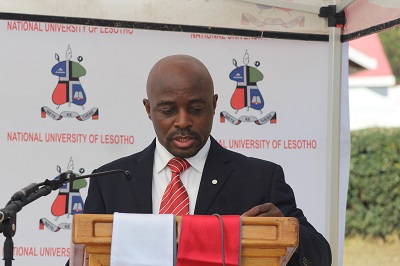
By Thoboloko Ntšonyane
MASERU – Lesotho is a signatory to many international conventions and treaties on human rights and boasts different law enforcement agencies.
However, the absence of the Human Rights Commission does not augur well for the victims of human rights violations.
The National University of Lesotho (NUL) has recently launched the Human Rights Chair. This Chair will undertake activities such as research and, develop curricula for Human Rights and community engagements.
NUL Human Rights Chair Dr Carol Chi Ngang said it is a “major concern” that efforts made to establish the Commission have been made but there has not borne any fruits.
Taking stock of the absence of the Human Rights Commission in the country, he said the “absence of a national Human Rights Commission as one of those human rights protection mechanisms is a major concern in the sense that it is unwise for a country to leave its most valuable assets, the people without adequate protection”.
He said the state has the obligation to protect its people as it is a primary guarantor of human rights protection.
Dr Ngang further posits that in the absence of the Commission, the people become “a liability”.
He said Lesotho is one of the few remaining countries in Africa and in the world that is yet to mount the Human Rights Commission.
A lecturer at the NUL’s Faculty of Law, Dr Lloyd Chigowe said the country is trying to “catch the bus that has already left”.
In the region, he pointed out that it is Lesotho that is without the Human Rights Commission.
Dr Chigowe argued that one of the challenges this poses is that some vulnerable members of the society do not have money to access the expensive justice system and cannot afford legal fees, and as such, they cannot have their rights enforced.
Senior Human Rights Advisor at the Office of the High Commissioner for Human Rights (OHCHR) in Lesotho, Michael Ngabirano said there are no recent data on the human rights situation in Lesotho, adding that it is not easy to measure their prevalence.
He appealed to the law faculty to undertake the pro bono work (free of charge) saying even if they do not win such cases, to establish the government’s position on a particular issue, and seek clarification and interpretation of laws.
Although it has not seen the light of the day, there are legal provisions for the establishment of the Human Rights Commission contained in the Eleventh Amendment to the Constitution of Lesotho Bill, 2022 which had failed to pass when the life of the 10th Parliament ended last month.
When functional, the Commission will be an autonomous body that will “exercise its powers and perform its functions without fear, favour or prejudice”.
The Human Rights Commission will among others be tasked to promote and protect, human rights and freedoms, investigate alleged violations of human rights and take appropriate measures to address them.
Its composition will have a wider representation with the Chairperson, Deputy Chairperson and five members drawn from different sectors of the society such as women, people with disabilities, youth and other marginalized groups.
For her part, the Director of Human Rights at the Ministry of Law and Justice Polo Chabane said the groundwork has been laid and the processes to engage and consult with the relevant stakeholders for the Human Rights Commission had been made.
Meanwhile, the Vienna Declaration and Programme of Action impresses on the States to “fulfil their obligations to promote universal respect for, and observance and protection of, all human rights and fundamental freedoms for all in accordance with the Charter of the United Nations”.
Dr Chigowe, however, said all is not lost as the country could borrow a leaf from the books of other countries and avoid the mistakes they did.


